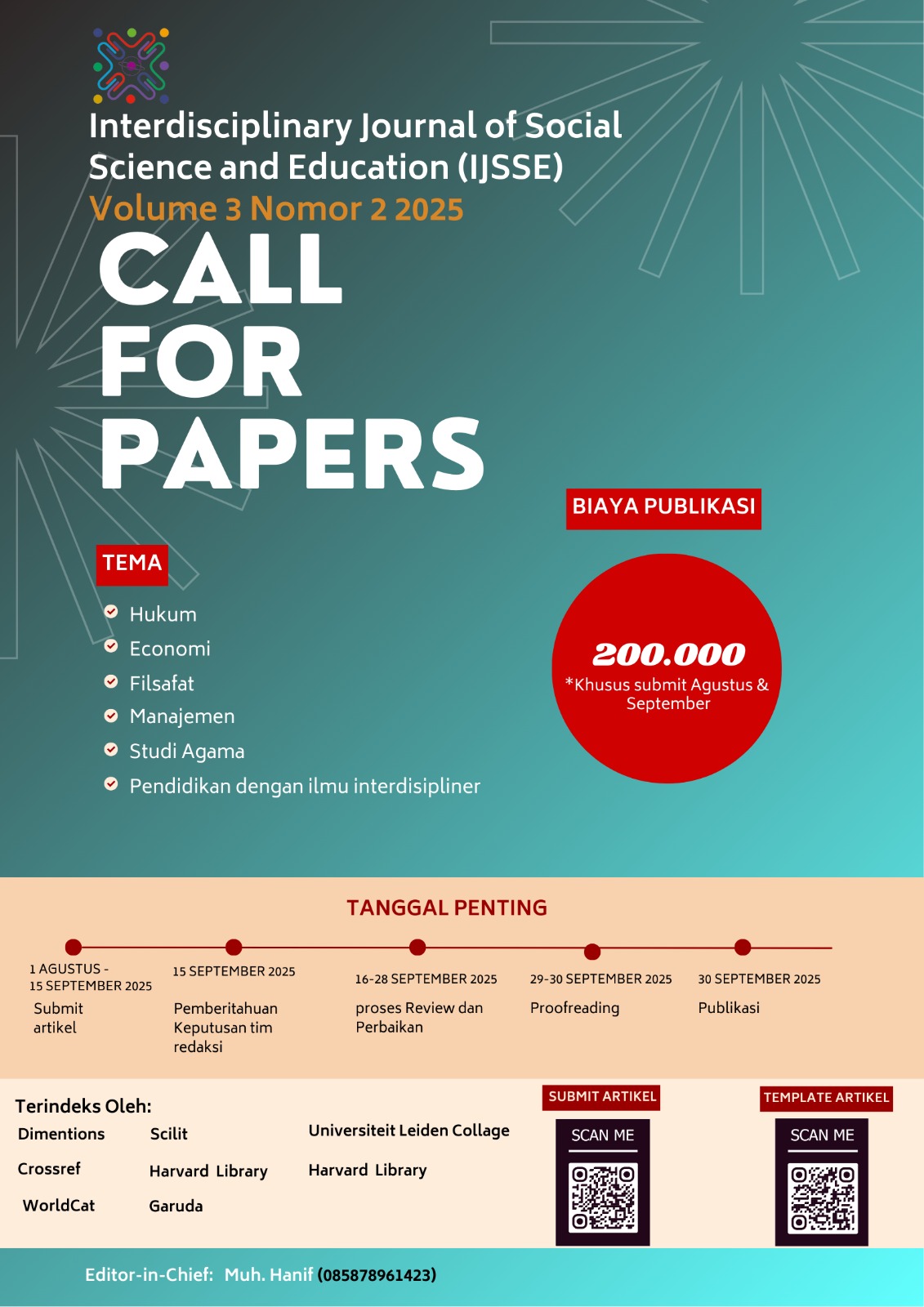Learning Outcomes in Aqidah Akhlaq: Analysis of Quality and Implementation
DOI:
https://doi.org/10.53639/ijsse.v3i1.77Keywords:
Quality of Learning, Faith and Morals, Material Achievement, Islamic EducationAbstract
Aqidah Akhlak learning in Madrasah plays a strategic role in shaping students' character and personality, aligning them with Islamic values. One key indicator of the success of this learning process is the quality of the material received and understood by students. This article aims to analyze the quality of Aqidah Akhlak material by reviewing aspects of planning, implementation, and student learning outcomes. The research employs a descriptive qualitative method, with data collection techniques such as observation, interviews, and documentation. The research findings suggest that while the overall quality of Aqidah Akhlak material outcomes is satisfactory, there are still some challenges in the implementation process, particularly concerning the use of learning media and methods of delivery. In order to address these challenges, innovative strategies are required. Such strategies would not only enhance the effectiveness of the curriculum but also make the Aqidah Akhlak content more accessible and easier for students to understand and apply in their everyday lives.
Downloads
References
Ahmad Dwi Nur Khalim. (2019). Pola Manajemen Pembelajaran Akidah Akhlaq Di MTs Negeri 6 Sleman. AL-FAHIM: Jurnal Manajemen Pendidikan Islam, 1(2), 36–57. https://doi.org/10.54396/alfahim.v1i2.57
Alam, L. (2016). Internalisasi nilai-nilai pendidikan islam dalam perguruan tinggi umum melalui lembaga dakwah kampus. Istawa: Jurnal Pendidikan Islam, 1(2), 101–119. https://doi.org/https://doi.org/10.24269/ijpi.v1i2.171
Creswell, J. W., & Creswell, J. D. (2017). Research design: Qualitative, quantitative, and mixed methods approaches. Sage publications.
Darmawan, R., & Achadi, M. W. (2024). Analisis Prinsip Pengembangan Materi (Relevansi, Konsistensi, Adequacy) Dan Implementasi Kma No 347 Tahun 2022 Pada Pelajaran Akidah Akhlak Kelas 4-6 (Studi Kasus Di Min 1 Yogyakarta). Pendas: Jurnal Ilmiah Pendidikan Dasar, 9(2), 2344–2362. https://doi.org/https://doi.org/10.23969/jp.v9i2.13207
Dinata, R. I., & Achadi, M. W. (2024). Analisis Pembelajaran Akidah Akhlak Dalam Kurikulum Merdeka Di Man 2 Sleman. Pendas: Jurnal Ilmiah Pendidikan Dasar, 9(2), 202–214. https://doi.org/https://doi.org/10.23969/jp.v9i2.13206
Hadiamsyah, Y., & Meidina, A. R. (2024). Educational Challenges and Islamic Values in the Age of Disruption. Interdisciplinary Journal of Social Science and Education (IJSSE), 199–210. https://doi.org/10.53639/ijsse.v2i3.52
Hadiamsyah, Y., Meidina, A. R., & Yani Nur, R. (2025). Peran Pendidikan dalam membetuk Karakter Anak Usia Dasar. QALAM: Jurnal Pendidikan Islam, 6(01), 39–45. https://doi.org/10.57210/qalam.v6.i01.68
Hariyanto, H., Meidina, A. R., & Azizah, M. (2024). Decentralization and the Fulfilments of Children’s Rights: Challenges and Opportunities for Local Government in Indonesia. Lex Scientia Law Review, 8(2), 677–706. https://doi.org/10.15294/lslr.v8i2.14373
Izzah, A. A., Umami, I., & Pane, E. (2023). Implementasi Manajemen Pembelajaran Aqidah Akhlak Berbasis Intellectual, Emotional, Dan Spiritual Quotient Dalam Membentuk Karakter Siswa Pada Madrasah Aliyah Di Kabupaten Lampung Selatan. Edukasi Islami: Jurnal Pendidikan Islam, 12(001). https://doi.org/https://doi.org/10.30868/ei.v12i001.7396
Marzuki, I., & Hakim, L. (2019). Strategi Pembelajaran Karakter Kerja Keras. Rausyan Fikr : Jurnal Pemikiran Dan Pencerahan, 15(1). https://doi.org/10.31000/rf.v15i1.1370
Meidina, A. R., Ali, Z. Z., Puspita, M., Ashlakha, H. N., & Zahro, A. (2024). What an Important Implementation of the Educational Rights of Adopted Children in Indonesia from an Islamic Jurisprudence Perspective? El-Aqwal : Journal of Sharia and Comparative Law, 85–96. https://doi.org/10.24090/el-aqwal.v3i1.11125
Muhaimin. (2005). Pengembangan kurikulum pendidikan agama Islam: Di sekolah, madrasah, dan perguruan tinggi. RajaGrafindo Persada.
Muhammad, S., Laili, F., Ashlakha, H. N., & Meidina, A. R. (2025). The Impact of the Family Values Crisis on Children’s Right to Education: An Islamic Legal Principles Perspective in Addressing the Challenges of the Modern Era. El-Aqwal : Journal of Sharia and Comparative Law, 17–34. https://doi.org/10.24090/el-aqwal.v4i1.13600
Rido, A., Kudus, A., & Hibatullah, H. (2020). Analisis manajemen pembelajaran dan kedisiplinan belajar dalam meningkatkan prestasi peserta didik. Tarbiyatu Wa Ta’lim, 2(1), 14–34.
Rofiah, N. H. (2016). Desain Pengembangan Pembelajaran Akidah Akhlak di Perguruan Tinggi. FENOMENA, 8(1). https://doi.org/10.21093/fj.v8i1.472
Sayuti, I., & Ningsih, S. R. (2024). Implementasi Manajemen Berbasis Madrasah Dalam Upaya Peningkatan Mutu Pembelajaran Mata Pelajaran Aqidah Akhlak di Smpit Fajar Ilahi Kecamatan Batu Aji Kota Batam. UNISAN JURNAL, 3(7), 546–551.
Syafril, M., & Zen, Z. (2019). Dasar-dasar ilmu pendidikan. Prenada Media.
Downloads
Published
How to Cite
Issue
Section
License
Copyright (c) 2025 Adnan Nuril Anwar, Bayu Saputra

This work is licensed under a Creative Commons Attribution-ShareAlike 4.0 International License.
Authors who publish with this journal agree to the following terms:
- Authors retain copyright and grant the journal right of first publication with the work simultaneously licensed under a Creative Commons Attribution License that allows others to share the work with an acknowledgement of the work's authorship and initial publication in this journal.
- Authors are able to enter into separate, additional contractual arrangements for the non-exclusive distribution of the journal's published version of the work (e.g., post it to an institutional repository or publish it in a book), with an acknowledgement of its initial publication in this journal.
- Authors are permitted and encouraged to post their work online (e.g., in institutional repositories or on their website) prior to and during the submission process, as it can lead to productive exchanges, as well as earlier and greater citation of published work (See The Effect of Open Access).


















